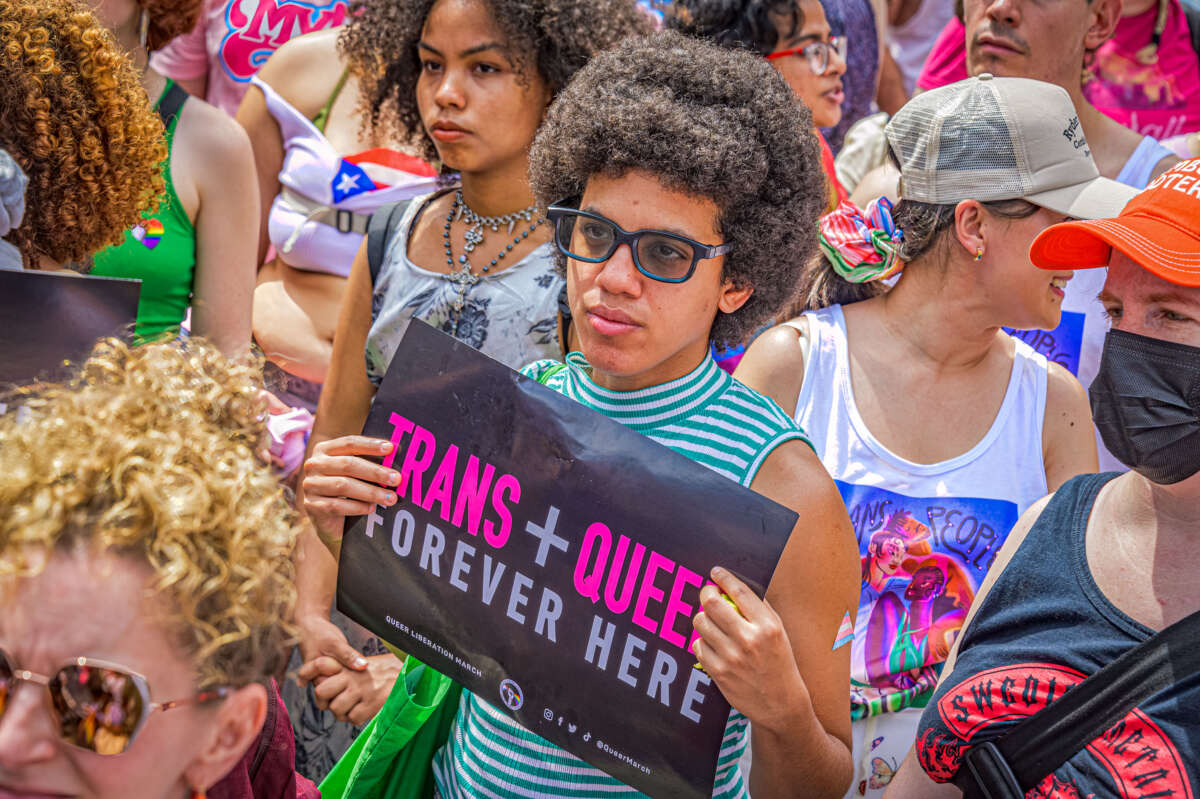Truthout is a vital news source and a living history of political struggle. If you think our work is valuable, support us with a donation of any size.
States that enact laws or policies that ban access to gender-affirming care for transgender or nonbinary people are causing LGBTQ residents to live in fear, according to a new poll commissioned by the Human Rights Campaign (HRC).
Such laws have lasting and damaging outcomes, not just for transgender people but for the LGBTQ community overall. “When anti-LGBTQ+ legislation is introduced, it not only aims to legislate LGBTQ+ people out of all spaces of daily life, it also codifies discrimination and stigma into law,” a statement from the organization said.
Gender-affirming care encompasses any number of treatments given to transgender or nonbinary individuals in order to support and affirm their gender identity. Such care ranges from therapeutic and psychological treatment to medical surgeries. All major medical organizations view gender-affirming care as both safe and life-saving for those that require it.
In spite of these endorsements from doctors and experts, bans on gender-affirming care have been proposed and enacted in several states where Republicans have total control of the government. Although most of these bans have focused on stopping transgender children from receiving care, some states have also sought to ban gender-affirming care for adults, too.
According to the HRC poll, a plurality of LGBTQ adults, 42.9 percent, said that laws banning gender-affirming care have impacted their physical and/or mental health, or the health of their loved ones. For transgender or nonbinary adults that took part in the survey, 80.1 percent said their health or the health of their loved ones deteriorated as a result of such bans.
Bans on gender-affirming care had rippling effects throughout the LGBTQ community as a whole — 8 in 10 LGBTQ adults, the poll found, said that the bans made them feel less safe and “worsen[ed] harmful stereotypes, discrimination, hate and stigma.”
The fear generated by gender-affirming care bans caused many LGBTQ people to consider moving, too, the survey showed. Over one-third of LGBTQ adults (34.1 percent) said they would move or already have moved from a state that enacts or already has in place a ban on gender-affirming care. One in five said they would consider leaving the country altogether, or have taken steps to do so, due to such laws.
Over half of transgender adults in the survey (52.7 percent) said they would move if a ban came to their state, or have already moved from a state that has put them in place already.
The poll was conducted earlier this year, from April to June, and comprised more than 14,400 responses from LGBTQ adults in all 50 states and Washington D.C.
In addition to the data it compiled, HRC also collected anonymous anecdotal responses from some individuals who took part in the survey, who said the growing trend of gender-affirming care bans across the country deeply troubled them.
“I have friends with transgender youth who have moved, are moving, and are strongly considering moving due to these laws in my state,” a cisgender gay man in Tennessee said.
“My parents are beginning to age, and I will not be able to care for them in the state in which they live because my spouse and I (both trans) want to have children at that point, and if we were to move back to South Carolina we could lose them,” a nonbinary person in Michigan told HRC.
“I feel like I have less value or right to be here than my cisgender neighbors and community. I am now afraid of them, and the harm they might intend towards me,” a transgender man in Idaho said.
A Data for Progress poll conducted earlier this year found that 8 percent of all transgender people in the U.S. have already moved away from their communities due to anti-LGBTQ legislation. That number, according to trans rights journalist Erin Reed, represents around 130,000 to 260,000 Americans who have felt the need to flee.
Many more are considering making a move, Reed said, analyzing other responses from that poll.
“Over a million people, themselves contemplating relocation in the coming months, remain in a state of apprehensive vigilance, awaiting the potential signal that they too must bid farewell to their homes,” Reed said in June. “The current trend doesn’t just underline a social trend; it underscores a profound human rights issue unfolding on our soil.”
A terrifying moment. We appeal for your support.
In the last weeks, we have witnessed an authoritarian assault on communities in Minnesota and across the nation.
The need for truthful, grassroots reporting is urgent at this cataclysmic historical moment. Yet, Trump-aligned billionaires and other allies have taken over many legacy media outlets — the culmination of a decades-long campaign to place control of the narrative into the hands of the political right.
We refuse to let Trump’s blatant propaganda machine go unchecked. Untethered to corporate ownership or advertisers, Truthout remains fearless in our reporting and our determination to use journalism as a tool for justice.
But we need your help just to fund our basic expenses. Over 80 percent of Truthout’s funding comes from small individual donations from our community of readers, and over a third of our total budget is supported by recurring monthly donors.
Truthout has launched a fundraiser to add 432 new monthly donors in the next 7 days. Whether you can make a small monthly donation or a larger one-time gift, Truthout only works with your support.
